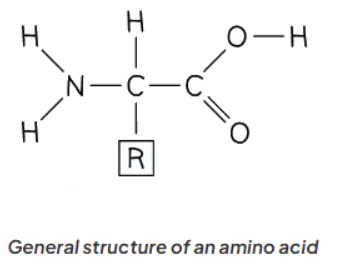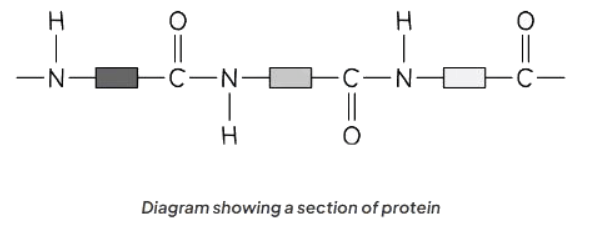Grade 11 Exam > Grade 11 Notes > Chemistry for Grade 11 (IGCSE) > Proteins
Proteins | Chemistry for Grade 11 (IGCSE) PDF Download
Proteins
- Proteins are condensation polymers that arise from amino acid monomers linked by amide bonds, also termed peptide links in proteins, resembling the arrangement found in nylon.
- While the structure resembles nylon, the constituents in proteins vary, comprising amino acids.
- Amino acids are diminutive molecules featuring NH2 and COOH functional groups.

- There exist twenty prevalent amino acids, each distinguished by their side chain denoted as R.
- Proteins can encompass varying sequences of these amino acids, ranging from 60 to 600 in number.
- These amino acids serve as the monomers that undergo polymerization to construct the protein structure.

- The diagram depicts the structure of proteins, with carbon chains represented by boxes.

Question for ProteinsTry yourself: How are proteins formed?View Solution
The document Proteins | Chemistry for Grade 11 (IGCSE) is a part of the Grade 11 Course Chemistry for Grade 11 (IGCSE).
All you need of Grade 11 at this link: Grade 11
|
103 docs|53 tests
|
FAQs on Proteins - Chemistry for Grade 11 (IGCSE)
| 1. What are proteins and why are they important for the body? |  |
Ans. Proteins are large molecules made up of amino acids that are essential for the growth, repair, and maintenance of tissues in the body. They play a crucial role in various bodily functions, including enzyme activity, immune response, and muscle development.
| 2. How can someone increase their protein intake in their diet? |  |
Ans. One can increase their protein intake by including protein-rich foods such as lean meats, poultry, fish, eggs, dairy products, legumes, nuts, and seeds in their diet. Protein supplements such as protein powders can also be used to boost protein intake.
| 3. What happens if someone does not consume enough protein in their diet? |  |
Ans. A lack of protein in the diet can lead to muscle loss, weakened immune function, slow wound healing, hair loss, and skin problems. It is important to ensure adequate protein intake to maintain overall health and well-being.
| 4. Can someone consume too much protein? |  |
Ans. Consuming excessive amounts of protein can put a strain on the kidneys and lead to dehydration. It is recommended to consume protein within the recommended daily intake levels to avoid potential health risks associated with high protein intake.
| 5. Are there any plant-based sources of protein for vegetarians and vegans? |  |
Ans. Yes, there are plenty of plant-based sources of protein for vegetarians and vegans, including tofu, tempeh, legumes, quinoa, nuts, seeds, and plant-based protein powders. These sources can help individuals meet their protein requirements without consuming animal products.

|
Explore Courses for Grade 11 exam
|

|
Signup for Free!
Signup to see your scores go up within 7 days! Learn & Practice with 1000+ FREE Notes, Videos & Tests.
Related Searches


















